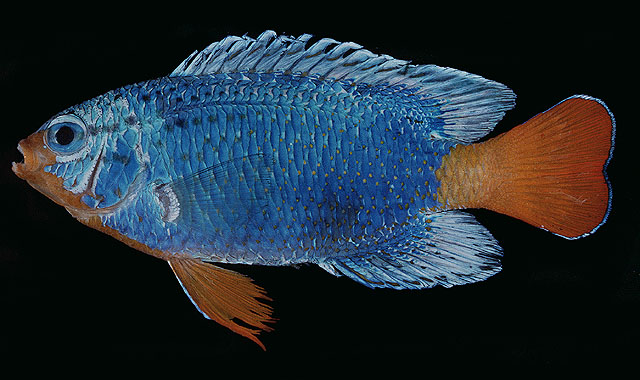| Pomacentridae (Damselfishes), subfamily: Pomacentrinae |
| 8.5 cm TL (male/unsexed) |
|
reef-associated; marine; depth range 0 - 10 m, non-migratory |
| Indo-West Pacific: eastern edge of the Indian Ocean and Western Australia to New Guinea, New Britain, Solomon Islands, Marianas and Caroline Islands, Indonesia, Philippines, Taiwan and Ryukyu Islands. Also known from Vanuatu and New Caledonia; Palau and Yap in Micronesia (Ref. 1602); Samoa (Ref. 4537). |
|
Dorsal spines (total): 13-13; Dorsal soft rays (total): 12-13; Anal spines: 2-2; Anal soft rays: 13-14. Description: Recognized by the brilliant light-blue color (Ref. 48636). This species exhibits a marked sexual dichromatism: juveniles and females usually have a small black spot at the rear base of the dorsal fin and (at least in Micronesia) lack yellow; males have a bright yellow snout and tail and sometimes, latter all orange in some regions; also lack the black spot (Ref. 7247). Body depth 2.2-2.4 in SL (Ref. 90102). |
| Adults are found amongst rubble and coral of clear sheltered lagoons and subtidal reef flats (Ref. 9710, 48636). They occur in groups of a male and several females or juveniles (Ref. 1602). Feed on algae, pelagic tunicates and copepods. Oviparous, distinct pairing during breeding (Ref. 205). Eggs are demersal and adhere to the substrate (Ref. 205). Males guard and aerate the eggs (Ref. 205). Diurnal species (Ref. 113699). |
|
Least Concern (LC); Date assessed: 03 February 2021 Ref. (130435)
|
| harmless |
Source and more info: www.fishbase.org. For personal, classroom, and other internal use only. Not for publication.
